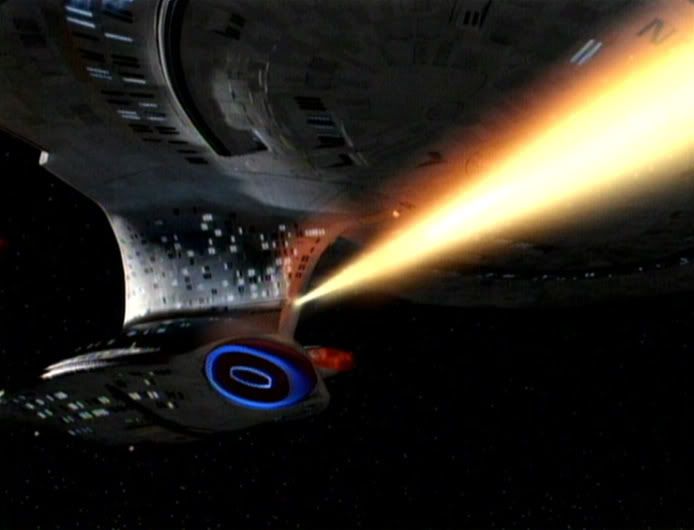Harley Filben wrote:GrahamKennedy wrote:I think that's pretty ridiculous. If anything, declaring FX Uber alles is the more dishonest route.
You missed my point. If we acknowledge that what we're seeing is FX than any and all discussion about firepower, speed or resilience of starships is meaningless since they are not starships but plastic toys. Either we pretend it's real or we don't. If we do then there is no FX only live footage. If we don't then there is no Captain Picard and Garak but only Patrick Stewart and Andrew Robinson.
It's mere semantics. When we talk of "Picard did this", we really mean "The fictional character of Picard as depicted by Patrick Stewart did this", but it's too wordy to bother saying it. Just as when we say "The GCS can do 5,000 c" what we really mean is "The fictional Starship which features in TNG and is depicted with a plastic model blah blah blah." But nobody talks like that. You may as well complain that we don't talk about "The conglomeration of cells which forms Graham Kennedy" rather than just calling me Graham.
Of course there's no ship, of course there's no Picard, but that doesn't mean we can't discuss it and speaking as if it were real doesn't mean we think it is or have to act as though it is.
GrahamKennedy wrote:If you do that then it's no longer real. Again either we explain it through characters being mistaken in which case we can continue our discussion about the speed of starships or firepower or we explain it through actor error or script error in which case our starships turn into plastic toys and any further discussion about their capabilities is meaningless.
It was never real, and isn't no matter what terms we discuss it in. You are saying it has to be an all or nothing approach; that we either have to act as though it's real and talk as if it's a documentary, or act as though it's not and not talk about it at all. Either approach can be taken, but they aren't the only approaches! We can very easily just treat it like a TV show with the inherent inaccuracies of that, and still refer to "Picard" and the speed of the ship.
GrahamKennedy wrote:No it isn't since you are not being consistent. The ships are plastic toys but Picard is really Captain Picard of the starship Enterprise.
Lol, if you like you can take it as read that I am mentally putting "the plastic model of..." every time I say "the Enterprise."
It doesn't affect my reading of the show one iota.
FX people actually have a far better record of keeping things consistent than writers
Oh, that very much depends on what spin you want to put on the effects. For instance I know people who prefer to believe that ships do not in fact fight at close range, because they never did in TOS. That alone would render inaccurate just about every battle sequence we have seen since TOS.
Then there's the fact that weapons fire emerges from pretty much random points on the ship throughout TOS, which rules all that out too. And the infamous "holes or covers" issue on re the back of the nacelles of the E-nil.
I could go on, but
if not for the simple fact that every other episode is written by a different writer. Also saying that FX is just something "to look cool" is a gross misinterpretation. Star Trek is not a radio drama. The audience expects visual information and I wonder what the ratings would be if no battle was ever shown on screen in DS9 or Voyager.
The audience expects it, but they don't generally expect realism in it. They expect coolness from it. So we have ships that fight at point blank range regardless of weapon ranges, ships that bank to turn, sound effects in space, energy weapons that appear as bright lines, yadda yadda yadda.
Furthermore I could easily say that writers simply drop terrawats, lightyears, mantle or crust into their scripts to "sound cool" without even bothering to perform the slightest math check.
They often do, I suspect. Certainly they mess up power and energy so often that they clearly don't know (or care) about the difference.
Quite frankly I think it's far more likely that FX guys will have a greater technical background than your usual writer.
Yes, quite probably. But they also openly state that they bend the expected reality to meet audience expectations.
